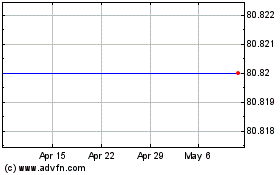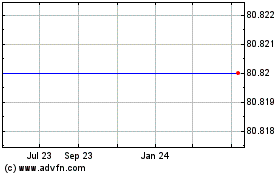By Joseph Walker And George Stahl
Abbott Laboratories' deal to acquire medical-products maker St.
Jude Medical Inc. for $25 billion was the largest in a flurry of
health-care deal-making totaling $40 billion on Thursday.
France's Sanofi SA said Thursday it made an unsolicited, $9.3
billion offer to purchase San Francisco-based Medivation Inc.,
which sells a lucrative prostate-cancer drug. AbbVie Inc. of North
Chicago, Ill., agreed to pay $5.8 billion to acquire a privately
held cancer-drug developer, Stemcentrx Inc., of South San
Francisco, Calif., for $5.8 billion, continuing AbbVie's aggressive
push to build an oncology business.
The deals are motivated by different factors, but show health
care remains an engine of M&A activity despite a crackdown on
tax-lowering maneuvers known as "inversions" that fueled a number
of large deals in recent years. Health-care companies have
announced $121.12 billion in global deal activity this year, the
second most after the technology industry's $145.78 billion in
deals so far for the year, according to Dealogic.
For Abbott, its acquisition is a way to bulk up its
medical-devices business to better compete against rivals Medtronic
PLC and Boston Scientific Corp. Abbott said it was also aiming to
gain a better negotiating position with its hospital customers,
which themselves have become larger and more powerful in recent
years.
AbbVie and Sanofi, meanwhile, are looking to compensate for
expected revenue declines as some of their biggest products lose
patent protection and face competition for the first time.
Abbott's deal to acquire St. Jude Medical is the largest
health-care merger so far this year. Abbott agreed to swap $46.75
in cash and 0.8708 shares for each St. Jude share. The offer values
each St. Jude share at about $85, representing a 37% premium to the
stock's closing price Wednesday.
Abbott has an eclectic mix of businesses that include
nutritional drinks like Ensure, glucose monitors for diabetes
patients, and selling branded generic pharmaceuticals in
international markets. Abbott spun off its brand-name drug business
into a separate company that became AbbVie in 2013.
Abbott's medical-devices business has been seen by some analysts
as a drag on the company's otherwise encouraging growth, especially
in emerging markets like China and Latin America.
Excluding the impact of foreign-currency fluctuations, Abbott's
medical-device sales rose 0.5% to $1.2 billion in the first quarter
of this year, lower than the company's overall revenue growth of
5.1%.
St. Jude's sales fell 1.4% to $5.54 billion in 2015, and its
earnings declined 12% to $880 million. The majority of the St.
Paul, Minn., company's revenue come from heart devices, including
pacemakers and implanted defibrillators. Those products complement
Abbott's line of stent devices, small tubes that prop open diseased
arteries, and could help the company cross-sell to hospitals,
analysts said. When combined, the merged company will have annual
cardiovascular sales of $8.7 billion.
The boards from both companies have approved the transaction,
which still requires shareholder and regulatory approvals. The
companies expect the deal to close in the fourth quarter.
Abbott CEO Miles White, speaking on a conference call with
analysts on Thursday, said acquiring St. Jude would enable the
combined company to better compete in an increasingly consolidated
U.S. health-care market.
U.S. hospitals, the largest purchasers of medical devices, have
grown larger and become more powerful negotiators in recent years.
Hospitals have also narrowed the number of suppliers they work with
as a way to keep down costs. Mr. White said having a larger product
portfolio and sales force would enable Abbott to win more business
in a more competitive market.
"The value of having breadth in your product lines, the changing
way the health-care community has consolidated or purchases or
selects products, all those factors come to a point over time where
the strategic value of Abbott and St. Jude coming together becomes
compelling," Mr. White said.
Another large medical device firm, Medtronic, gave a similar
rationale when it agreed to acquire Covidien PLC in 2014, arguing
that hospitals would increasingly look to purchase medical supplies
from fewer and fewer vendors. Medtronic, which also inverted its
tax base to Ireland in the Covidien merger, is a major competitor
to St. Jude in the pacemaker and implanted defibrillator
markets.
Michael Weinstein, a J.P. Morgan analyst, said in a note to
clients that "investors are likely to frown on" the strategic
rationale of the deal because it shifts Abbott away from its focus
on growing in emerging markets through its consumer businesses such
as nutritional food products. St. Jude has also had "repeated
stumbles in executing on its pipeline," Mr. Weinstein said.
Abbott sees the deal adding to its adjusted earnings in the
first full year after closing. On a per-share basis, Abbott
estimates the buy increasing earnings by 21 cents in 2017 and 29
cents in 2018. The companies see sales and operational benefits of
$500 million by 2020.
In 2015, Abbott's sales rose 0.8% to $20.4 billion, and its
earnings nearly doubled to $4.4 billion, which included a gain from
the sale of discontinued operations. As of Wednesday, Abbott had a
market value of $64.6 billion.
Abbott's deal for St. Jude comes as the company is trying to
complete its $5.8 billion purchase of Alere Inc., the health-care
diagnostics company that is grappling with foreign corruption
probes.
Abbott agreed in February to pay $56 per share to acquire Alere,
a 51% premium to the company's share price before the deal's
announcement. Since then, Alere has disclosed it has received a
subpoena regarding a foreign corruption investigation over payments
in Africa, Asia and Latin America. The company also has missed a
deadline to file its 2015 annual report with regulators because it
is analyzing its revenue recognition in Africa and China over the
past three years.
Last week, Mr. White declined to affirm his commitment to the
deal. Thursday, though, Abbott discussed plans to issue $3 billion
of stock "to rebalance its capital structure" and help finance the
Alere and St. Jude deals.
--Peter Loftus contributed to this article.
Write to George Stahl at george.stahl@wsj.com and Joseph Walker
at joseph.walker@wsj.com
(END) Dow Jones Newswires
April 28, 2016 17:27 ET (21:27 GMT)
Copyright (c) 2016 Dow Jones & Company, Inc.
SJM (NYSE:STJ)
Historical Stock Chart
From Mar 2024 to Apr 2024

SJM (NYSE:STJ)
Historical Stock Chart
From Apr 2023 to Apr 2024
